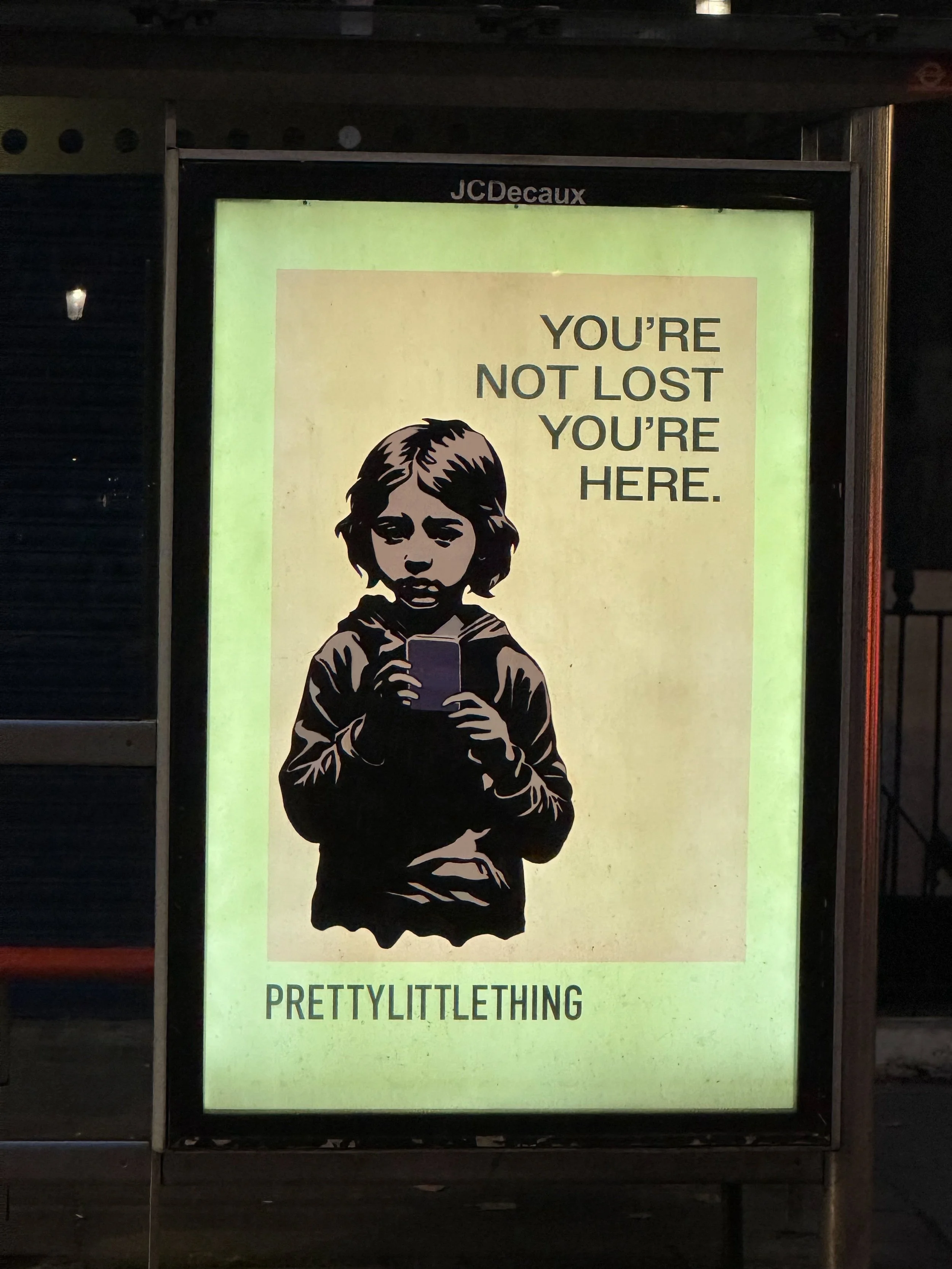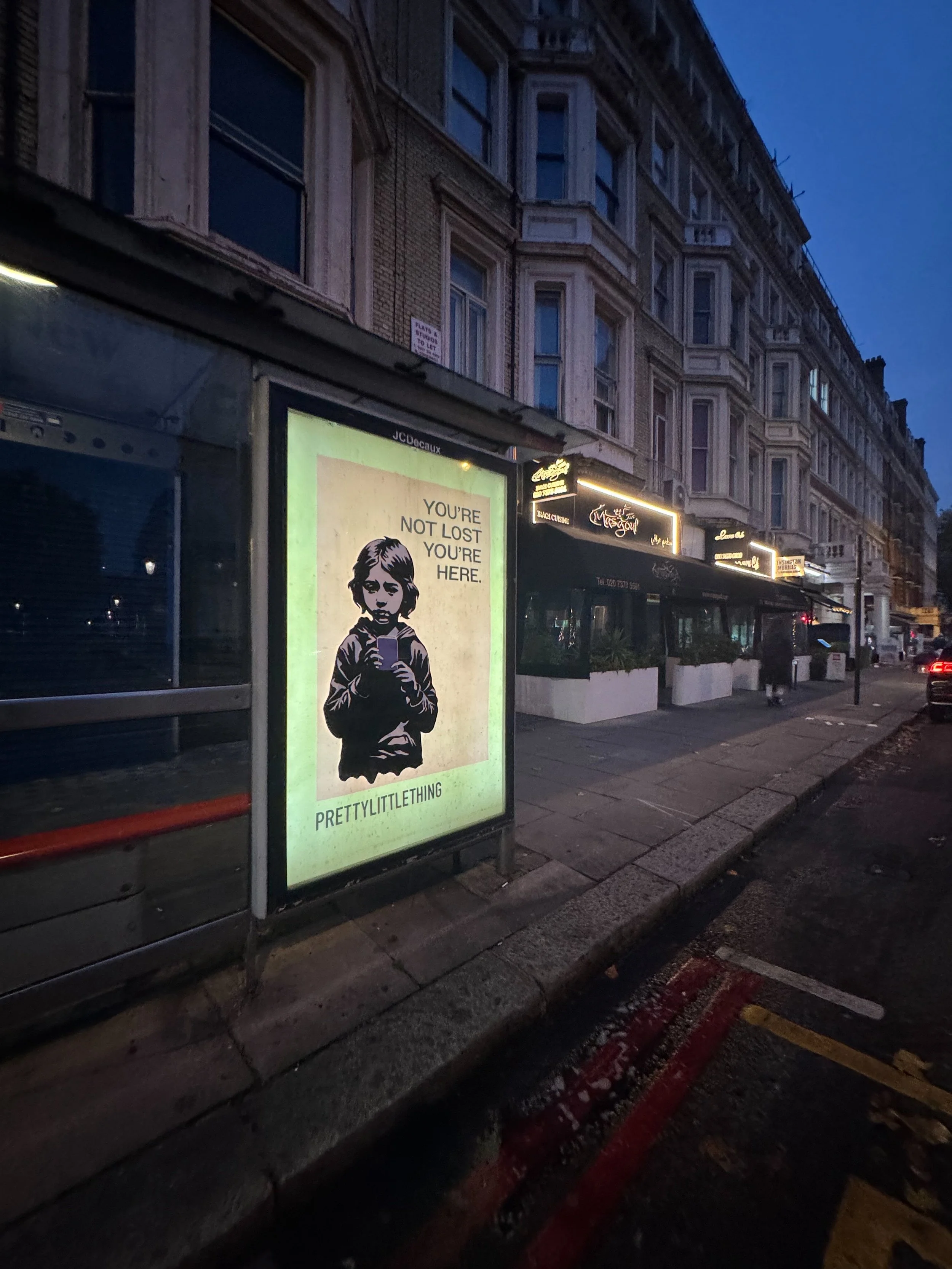Pretty Little Minds
Acrylic ink based drawing with glue coating, cut-out and pasted on billboard advertisement
Cromwell Road, London. Executed 1st October 2024
In the early hours of 1st October 2024, I found myself returning once again to the streets of London, this time to Cromwell Road, where for weeks I had been passing by a billboard for Pretty Little Thing. Its slogan; “You are not lost, you are here” struck me every time I saw it. The phrase was meant to reassure, but to me it revealed a deeper contradiction, a quiet irony. I kept thinking of the many young girls and teenagers shaped by the visual culture that such campaigns help sustain, a generation trying to find themselves while constantly being told who to be. The words said you are here, yet so many of them, emotionally, are not.
That tension became the starting point for Pretty Little Minds. I drew a young girl, pale, fragile, and somehow distant, her posture heavy, her eyes hollow. She appears present, but the light has gone out of her expression. Her sadness isn’t theatrical; it’s subdued, the kind that comes from saturation, from having seen too much, compared too much, and felt too little that’s real. I imagined her as someone who spends hours scrolling, absorbing curated perfection until her own sense of self dissolves under the weight of it. She is here, as the billboard says, but only physically. Inside, she’s elsewhere.
The artwork began as a drawing on paper, cut out and carefully positioned onto the billboard’s empty space beneath the campaign slogan. I wanted the contrast to feel subtle, almost seamless, as if the girl had always been there, a silent figure living inside the advertisement itself, somehow also melting away. I installed it before dawn, when the city was still quiet, and the first commuters of the day would encounter it without expecting to. I didn’t want to shout; I wanted to interrupt softly, to make people stop and reconsider what they were looking at.
The dialogue between my image and Pretty Little Thing’s message was deliberate. Their slogan, intended as empowerment, became the framework for my own critique. To me, it symbolised the paradox faced by so many young women today: surrounded by messages of self-love that still depend on conformity and image. Pretty Little Minds asks what happens when beauty becomes identity, and identity becomes performance, when fashion and algorithms combine to convince young people that being “here” means existing only through what others see.
Visually, I approached the image with restraint. The girl’s form was drawn in my characteristic black-and-white palette, the simplicity allowing her emotion to breathe. I wanted her to look fragile against the massive, glossy surface of the billboard, human vulnerability confronting corporate perfection. Her sadness, set against the words “You are not lost, you are here,” turns the entire advert into a question: where is she, really?
Looking back, I see Pretty Little Minds as one of my most resonant public interventions, not because it was confrontational, but because it merged critique and empathy. It became part of the very visual system it was questioning. People saw it as an act of rebellion, but to me it was more like a mirror held up to an industry, and to all of us, asking whether the images we create to inspire actually end up eroding the minds they reach.
This work deepened my mission: to use public space not to condemn, but to awaken, to remind us that beneath the layers of marketing and digital illusion, there are still real people struggling to find presence, confidence and truth. In Pretty Little Minds, the girl doesn’t accuse or protest; she simply exists, quietly lost within the machinery that claims to see her.



